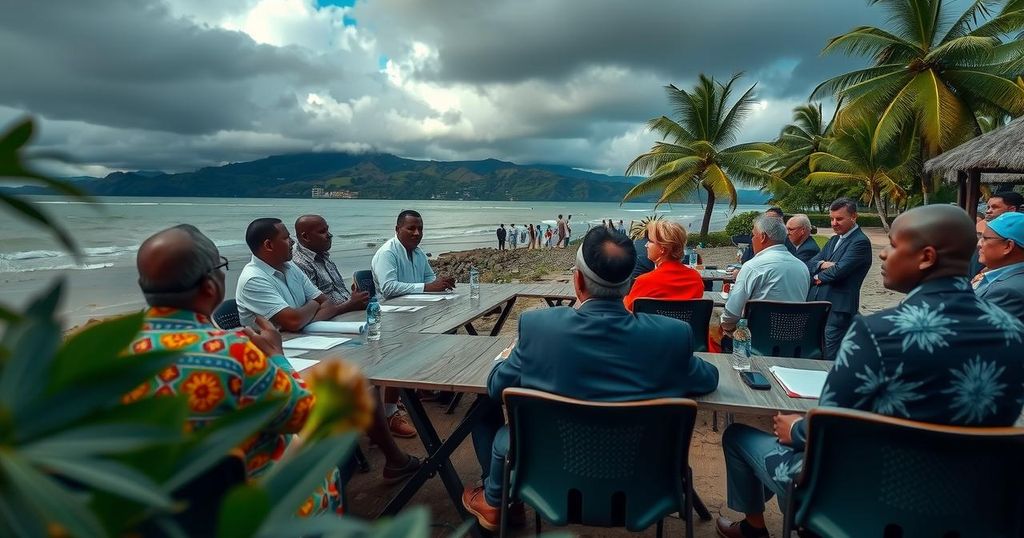The Commonwealth leaders gathered in Samoa for a summit focusing on climate change and Britain’s reparations for its role in slavery. Tuvalu’s climate minister warned that fossil fuel projects threaten their security, while discussions on reparations saw mixed responses from UK leadership. This convergence of environmental and historical justice reflects a critical moment for Commonwealth nations.
On Thursday, the Commonwealth heads of government convened in Samoa to address critical issues of climate change and the potential reparations for Britain’s colonial past, particularly its involvement in transatlantic slavery. The summit, led by King Charles, includes representatives from 56 countries, many of whom have historical ties to the former British Empire. A significant concern for attendees stems from the impact of climate change, particularly for small island nations that are disproportionately affected by rising sea levels. Tuvalu’s climate change minister, Maina Vakafua Talia, emphasized the urgency of adhering to the Paris Accord’s goal of limiting global warming to 1.5 degrees Celsius, characterizing new fossil fuel projects as a “death sentence” for his nation. Australian Foreign Minister Penny Wong stated, “Climate change is an existential threat. It is the No. 1 national security threat. It is the No. 1 economic threat to the peoples of the Pacific and to many members of the Commonwealth.” Additionally, discussions regarding the potential for reparations from Britain for historical injustices associated with slavery were anticipated to be a dominant topic. While British leader Keir Starmer indicated that the UK would not issue an apology or focus on financial reparations, he expressed a willingness to engage with leaders who wish to discuss the issue. This stance has caused frustration among certain Caribbean and African nations actively seeking reparations, showcasing a growing demand for acknowledgment and restitution for past atrocities. Eric Phillips from CARICOM remarked about the significance of the Commonwealth meeting to initiate dialogue on reparations, emphasizing that “whenever those affected by atrocities ask to talk, there should always be a willingness to sit down and listen.” Samoan Prime Minister Fiame Naomi Mata’afa provided a warm welcome to the assembled leaders, who included notable figures such as Australian Prime Minister Anthony Albanese and British Prime Minister Keir Starmer. The ongoing discussions are crucial not only for addressing immediate concerns regarding climate change but also for fostering a historical reckoning with colonial impacts that persist to this day.
The Commonwealth of Nations, primarily comprising countries that were once part of the British Empire, has convened in a summit that emphasizes pressing global issues. Climate change poses a significant threat to numerous member nations, particularly small island states like Tuvalu, which are vulnerable to the dangers of rising sea levels and the consequences of global warming. These nations seek solidarity and commitment from wealthier states to mitigate the climate crisis. The conversation surrounding reparations has gained momentum particularly in the context of transatlantic slavery, calling for recognition of historical injustices and attempts to address the lasting socio-economic inequalities that have arisen from such injustices. Organizations like CARICOM advocate for such dialogues and reparative measures, seeking to engage former colonial powers in discussions about accountability and restitution. The backdrop of this summit highlights an urgent intersection of environmental and historical justice themes, necessitating earnest discussions among member states.
The Commonwealth Summit in Samoa serves as a pivotal platform for leaders to deliberate on urgent matters related to climate change and historical accountability regarding slavery reparations. With nations at risk from climate impact demanding immediate action and acknowledgement of historical wrongs, the discussions hold significant implications for global partnerships and moral responsibility. The outcomes of these deliberations could shape future policies and reparative measures within the Commonwealth and beyond, addressing the pressing need for environmental protection and reconciliation of historical grievances.
Original Source: stratnewsglobal.com







